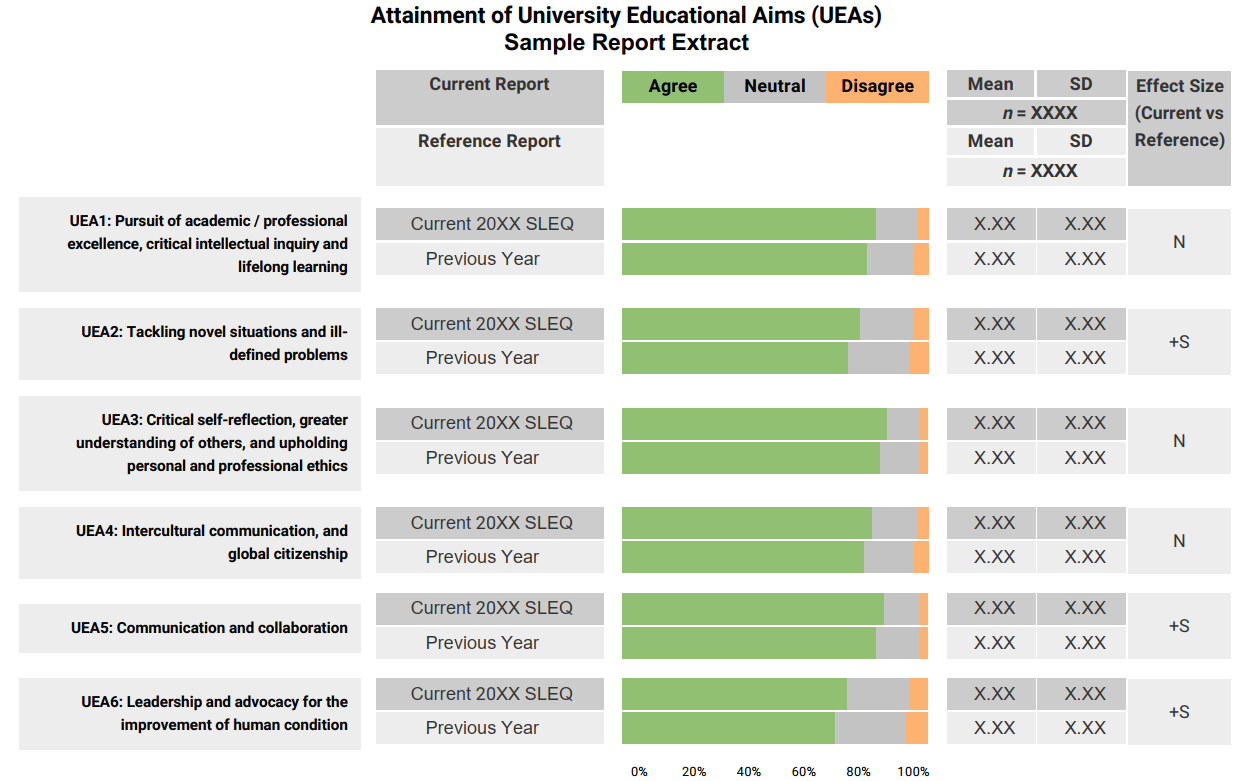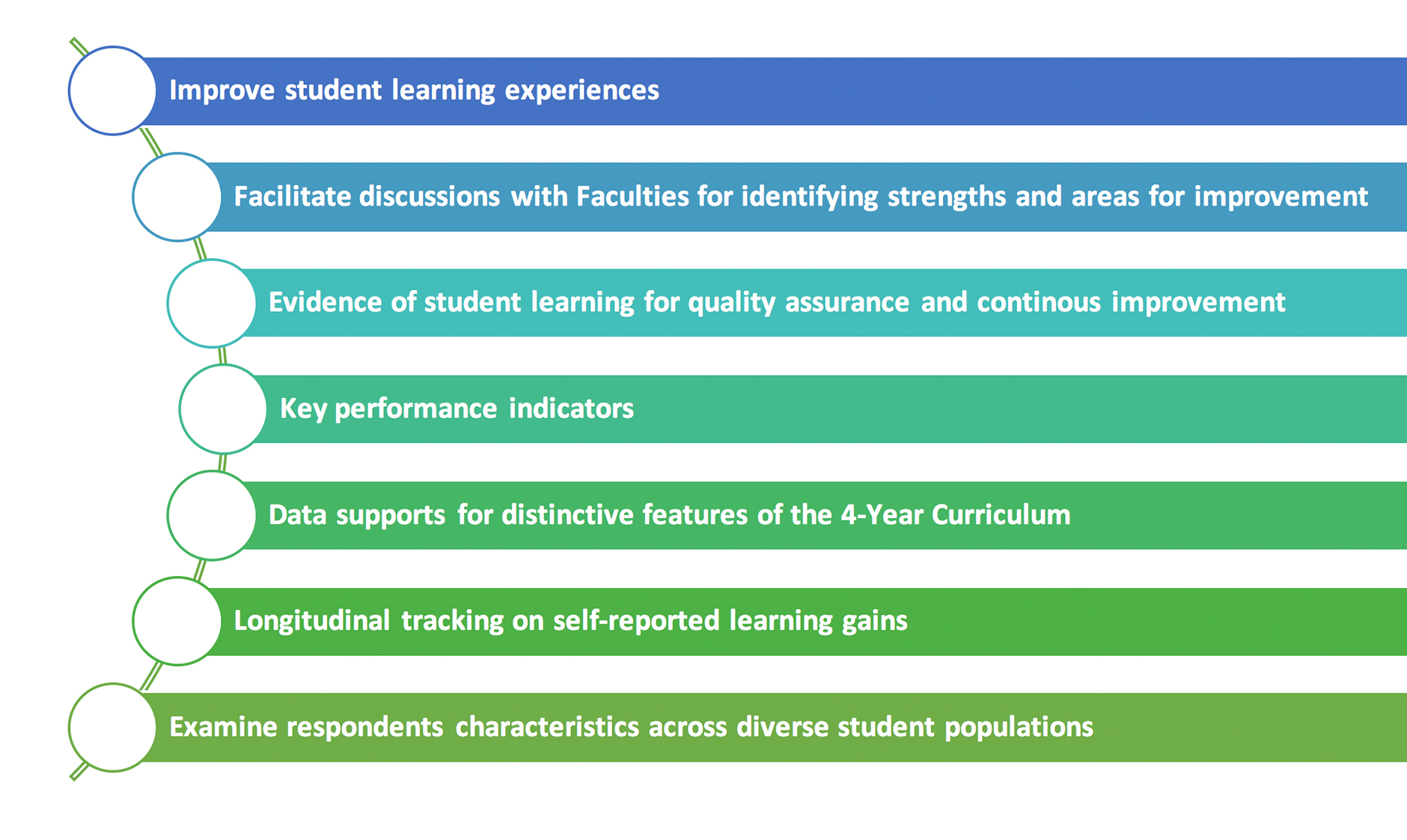Contents
Questionnaire Design and Development
With reference to the presage-process-product model of student learning (Prosser & Trigwell, 1999), the Student Learning Experience Questionnaire (SLEQ) is developed to assess primarity a broad range of students’ perceptions related to learning and teaching and students’ perceptions of their achievement of the University’s educational aims. Questionnaire development and revision have gone through piloting and focus group discussions to ensure the clarity and the robustness of the developed / revised questions. The questionnaire is reviewed and refined frequently to capture the latest teaching and learning practice.

Data Analysis
The survey data are analysed at institutional, Faculty, Department, curriculum and programme levels. Within cohort, longitudinal tracking is conducted on the individual students who took the survey at their freshman and senior years. Across cohorts, cross-sectional comparisons are performed over years. Comparisons are also made between students from different cultural and educational backgrounds and in various study modes. Students’ written comments are processed and analysed in different themes.
Additionally, both quantitative and qualitative findings are reported by themes, such as, on academic advising, Common Core curriculum, e-learning, English language enhancement and residential education, in support of the enhancement of students’ learning experiences.
Advanced Psychometrics
Advanced psychometric methods were employed to analyse data collected from institutional surveys of students’ learning experiences. Psychometric properties of the instruments have been regularly examined to provide evidence on reliability and validity in support of the reported scores. Good reliability and validity are demonstrated through psychometric analyses based on classical test theory and modern measurement theory. Furthermore, studies have been performed to continuously collect validity evidence using advanced psychometrics and contemporary methodologies, such as, examining the measurement invariance/ equivalence of the SLEQ (Zhao et al., 2017), quantifying learning gains using a more accurate measure (Zhao et al., 2016), and examining overall student learning experience during the COVID-19 pandemic using various indicators of teaching and learning.Text Analytics
Automatic text-mining approaches were pioneered for analysing the contents of students’ written comments regarding teaching and learning (Ko et al., 2020). With the aid of automatic text analytic tools (e.g., LeximancerTM), the frequency, co-occurrence, and inter-relationship of key themes and concepts in student comments are visualized in graphics. It also allows for examining how key concepts varied between students from different study years, and whether key concepts in comments on the best aspects and aspects to be improved differed.
Reference
- Chan, Y., Huen, J., Li, T. T., & Zhao, M. Y. (2021, December, 8–10). Undergraduate students’ experience of online learning during COVID-19: Findings from quantitative and qualitative analyses [Conference presentation abstract]. International Conference on Learning and Teaching 2021, Hong Kong, China. https://www.eduhk.hk/iclt2021/
- Ko, W. T., Chan, Y. W., & Zhao, M. Y. (2020, December, 2–4). An automatic approach to analyzing students’ qualitative feedback in relation to teaching and learning [Conference presentation abstract]. International Conference on Learning and Teaching 2020, Hong Kong, China. https://www.eduhk.hk/iclt2020/
- Prosser, M., & Trigwell, K. (1999). Understanding learning and teaching: The experience in higher education. Buckingham, PA: Society for Research into Higher Education & Open University Press.
- Zhao, Y., Huen, J.M.Y., & Chan, Y.W. (2017). Measuring longitudinal gains in student learning: A comparison of Rasch scoring and summative scoring approaches. Research in Higher Education, 58(6), 605-616. https://doi.org/10.1007/s11162-016-9441-z.
- Zhao, Y., Huen, J.M.Y., & Prosser, M. (2017). Comparing perceived learning experiences of two concurrent cohorts under curriculum reforms in Hong Kong: A multiple-group confirmatory factor analysis approach. Quality Assurance in Education, 25(3), 270-286. https://doi.org/10.1108/QAE-11-2016-0070.
EduData Resources
Learning Outcome Assessment Tools
Collegiate Learning Assessment Plus (CLA+) link
Launched by the Council for Aid to Education (CAE) in the United States, CLA+ intends to measure student performance in critical thinking, problem-solving, scientific and quantitative reasoning, critical reading and evaluation, and written communication.
Launched by the Council for Aid to Education (CAE) in the United States, CLA+ intends to measure student performance in critical thinking, problem-solving, scientific and quantitative reasoning, critical reading and evaluation, and written communication.
Cooperative Institutional Research Program (CIRP) link
Administered by Higher Education Research Institute (HERI), CIRP consists of the Freshman Survey (TFS), Your First College Year (YFCY) Survey, the College Senior Survey (CSS), and Diverse Learning Environments Survey (DLE), capturing various aspects of student development, university experience and academic, civic and diversity outcomes.
Administered by Higher Education Research Institute (HERI), CIRP consists of the Freshman Survey (TFS), Your First College Year (YFCY) Survey, the College Senior Survey (CSS), and Diverse Learning Environments Survey (DLE), capturing various aspects of student development, university experience and academic, civic and diversity outcomes.
HEIghten®Outcomes Assessment Suite link
Developed by Educational Testing Service (ETS), HEIghten® is a suite of computer-delivered and modular assessments designed to assess learning effectiveness and demonstrate the validity of an education program. The assessments currently include civic competency and engagement, critical thinking, intercultural competency & diversity, quantitative literacy, and written communication.
Developed by Educational Testing Service (ETS), HEIghten® is a suite of computer-delivered and modular assessments designed to assess learning effectiveness and demonstrate the validity of an education program. The assessments currently include civic competency and engagement, critical thinking, intercultural competency & diversity, quantitative literacy, and written communication.
National Student Survey (NSS) link
Commissioned by the Higher Education Funding Council for England (HEFCE), NSS focuses on assessing aspects of the student learning experience, such as assessment and feedback, teaching of particular courses, organization and management, academic support, learning opportunities, learning community, student voice, and overall satisfaction.
Commissioned by the Higher Education Funding Council for England (HEFCE), NSS focuses on assessing aspects of the student learning experience, such as assessment and feedback, teaching of particular courses, organization and management, academic support, learning opportunities, learning community, student voice, and overall satisfaction.
National Survey of Student Engagement (NSSE) link
Administered by Indiana University in the United States, NSSE is used to measure student engagement in programs and activities that institutions provide for student learning and personal development, relating to the aspects of academic challenge, learning with peers, experiences with Faculty and campus environment.
Administered by Indiana University in the United States, NSSE is used to measure student engagement in programs and activities that institutions provide for student learning and personal development, relating to the aspects of academic challenge, learning with peers, experiences with Faculty and campus environment.
Valid Assessment of Learning in Undergraduate Education (VALUE Rubrics) link
Developed by the Association of American Colleges & Universities (AAC&U), the VALUE Rubrics can be used as a component of assessment strategy at the institution or program level, and covers 16 rubrics, such as critical thinking, inquiry and analysis, creative thinking, quantitative literacy, information literacy, teamwork, problem solving, intercultural knowledge and competence, ethical reasoning and global learning.
Developed by the Association of American Colleges & Universities (AAC&U), the VALUE Rubrics can be used as a component of assessment strategy at the institution or program level, and covers 16 rubrics, such as critical thinking, inquiry and analysis, creative thinking, quantitative literacy, information literacy, teamwork, problem solving, intercultural knowledge and competence, ethical reasoning and global learning.
Learning Outcome Assessment Tools
(Brief descriptions about each journal’s scope/aims are adapted from their respective websites.)
Applied Measurement In Education link
The journal covers original research studies, innovative strategies for solving educational measurement problems, and integrative reviews of current approaches to contemporary measurement issues, with an aim to improve communication between academics and practitioners and bridge the gap between theory and practice.
The journal covers original research studies, innovative strategies for solving educational measurement problems, and integrative reviews of current approaches to contemporary measurement issues, with an aim to improve communication between academics and practitioners and bridge the gap between theory and practice.
Assessment & Evaluation in Higher Education link
The journal publishes papers and reports on all aspects of assessment and evaluation within higher education, with the purpose of advancing understanding of assessment and evaluation practices and processes, particularly the contribution that these make to student learning and to course, staff and institutional development.
The journal publishes papers and reports on all aspects of assessment and evaluation within higher education, with the purpose of advancing understanding of assessment and evaluation practices and processes, particularly the contribution that these make to student learning and to course, staff and institutional development.
British Journal of Educational Technology (BJET) link
BJET publishes theoretical perspectives, methodological developments and high quality empirical research that demonstrate whether and how applications of instructional/educational technology systems, networks, tools and resources lead to improvements in formal and non-formal education at all levels.
BJET publishes theoretical perspectives, methodological developments and high quality empirical research that demonstrate whether and how applications of instructional/educational technology systems, networks, tools and resources lead to improvements in formal and non-formal education at all levels.
Computers & Education link
With aims to increase knowledge and understanding of ways in which digital technology can enhance education, the journal welcomes research papers on the pedagogical uses of digital technology, where the focus is broad enough to be of interest to the wider education community.
With aims to increase knowledge and understanding of ways in which digital technology can enhance education, the journal welcomes research papers on the pedagogical uses of digital technology, where the focus is broad enough to be of interest to the wider education community.
Educational and Psychological Measurement (EPM) link
The journal publishes referred scholarly work from all academic disciplines interested in the study of measurement theory, problems, and issues. Theoretical articles address new developments and techniques, and applied articles deal with innovation applications.
The journal publishes referred scholarly work from all academic disciplines interested in the study of measurement theory, problems, and issues. Theoretical articles address new developments and techniques, and applied articles deal with innovation applications.
Educational Measurement: Issues and Practice (EM:IP) link
With the purpose of promoting a better understanding of and reasoned debate on assessment, evaluation, testing, and related issues of practical importance to educators and the public, EM:IP publishes articles that are both timely and have the potential to advance the policies and practices of educational measurement.
With the purpose of promoting a better understanding of and reasoned debate on assessment, evaluation, testing, and related issues of practical importance to educators and the public, EM:IP publishes articles that are both timely and have the potential to advance the policies and practices of educational measurement.
Higher Education link
The journal publishes authoritative overview articles, comparative studies and analyses of particular problems or issues, reporting on developments in both public and private Higher Education sectors.
The journal publishes authoritative overview articles, comparative studies and analyses of particular problems or issues, reporting on developments in both public and private Higher Education sectors.
Higher Education Research & Development (HERD) link
HERD publishes scholarly articles that make a significant and original contribution to the theory, practice or research of higher education, with an aim to inform and challenge researchers, teachers, administrators, policy-makers and others concerned with the past, present and future of higher education.
HERD publishes scholarly articles that make a significant and original contribution to the theory, practice or research of higher education, with an aim to inform and challenge researchers, teachers, administrators, policy-makers and others concerned with the past, present and future of higher education.
Journal of Educational Measurement (JEM) link
JEM publishes original measurement research reflecting current issues and innovations within education broadly conceived, and is a vehicle for sharing improvements and innovations in educational measurement.
JEM publishes original measurement research reflecting current issues and innovations within education broadly conceived, and is a vehicle for sharing improvements and innovations in educational measurement.
Research In Higher Education link
The journal publishes studies that examine issues pertaining to postsecondary education, and has particular interest in studies that apply advanced quantitative research methods to issues in postsecondary education or address postsecondary education policy issues.
The journal publishes studies that examine issues pertaining to postsecondary education, and has particular interest in studies that apply advanced quantitative research methods to issues in postsecondary education or address postsecondary education policy issues.
Studies in Higher Education link
The journal publishes research-based articles dealing with higher education issues from either a disciplinary or multi-disciplinary perspective, and welcomes contributions that seek to enhance understanding of higher education policy, institutional management and performance, teaching and learning, and the contribution of higher education to society and the economy.
The journal publishes research-based articles dealing with higher education issues from either a disciplinary or multi-disciplinary perspective, and welcomes contributions that seek to enhance understanding of higher education policy, institutional management and performance, teaching and learning, and the contribution of higher education to society and the economy.
The Internet and Higher Education link
The journal devotes to addressing contemporary issues and future developments related to online learning, teaching, and administration on the Internet in post-secondary settings.
The journal devotes to addressing contemporary issues and future developments related to online learning, teaching, and administration on the Internet in post-secondary settings.
Educational Assessment / Institutional Research Community
American Educational Research Association (AERA) link
AERA is a national interdisciplinary research association devoted to the scientific study of education and learning.
Association for Institutional Research (AIR) link
AERA is a national interdisciplinary research association devoted to the scientific study of education and learning.
Association for Institutional Research (AIR) link
AIR is a non-profit organization that supports higher education professionals in institutional research, assessment, and strategic use of information for effective decision making and planning.
Association for the Assessment of Learning in Higher Education (AALHE) link
AALHE is a professional association and provides a forum for assessment practitioners to discuss the use of assessment to improve student learning and institutional effectiveness.
AALHE is a professional association and provides a forum for assessment practitioners to discuss the use of assessment to improve student learning and institutional effectiveness.
International Association for Educational Assessment (IAEA) link
IAEA offers a global forum for educational agencies involved in all forms of educational assessment, in primary or secondary schools, colleges or the workplace.
IAEA offers a global forum for educational agencies involved in all forms of educational assessment, in primary or secondary schools, colleges or the workplace.
National Council on Measurement in Education (NCME) link
NCME is a professional organization for professionals and practitioners involved in assessment, evaluation, testing, and other aspects of educational measurement.
NCME is a professional organization for professionals and practitioners involved in assessment, evaluation, testing, and other aspects of educational measurement.
Network on Education Quality Monitoring in the Asia Pacific (NEQMAP) link
NEQMAP serves as a regional networking and knowledge exchange platform among countries in the Asian-Pacific region, focusing on student learning assessment and education quality monitoring.
NEQMAP serves as a regional networking and knowledge exchange platform among countries in the Asian-Pacific region, focusing on student learning assessment and education quality monitoring.
Our Projects
| Title | Researchers |
|---|---|
| WeThrive: A positive education informed interdisciplinary programme and a strengths-based pedagogical approach link | Dr. M. Zhao, Professor G. Kochhar-Lindgren, Dr X. Hu, Dr S. Lu, & Dr. C. K. Y. Chan |
| Undergraduate students’ experience of online learning during COVID-19: findings from quantitative and qualitative analyses | Ms. Y. Chan, Dr. J. Huen, Ms. T. T. Li, & Dr. M. Zhao |
| Application of text analytics in examining students’ qualitative feedback in relation to teaching and learning. | Ms. R. Ko, Ms. Y. Chan,& Dr. M. Zhao |
| Developing an institution-wide assessment of global and intercultural competence | Dr. M. Zhao, Dr. C. K. Y. Chan |
| Students’ voices on university residential experience link | Dr. M. Zhao, Mr. T. Cham, Ms. Y. Chan, & Ms. M. Cheng |
| Student learning experiences among diverse student populations in the internationalised learning environment | Dr. M. Zhao, Mr. T. Cham, Ms. T. Lam, & Ms. Y. Chan |
| Advancing the assessment of clinical experiential learning in medical and health sciences education link | Dr. M. Zhao, Dr. C. K. Y. Chan, Dr. W. Li, Dr. J. Chung |
| Measuring longitudinal gains of self-reported learning outcomes in higher education link | Dr. M. Zhao, Ms. J. Huen, & Ms. Y. Chan |
| Comparing students’ learning experiences between double cohort under curriculum reform in Hong Kong. link | Dr. M. Zhao, Ms. J. Huen, & Prof. M. Prosser |
| Value-added measurement in higher education: assessing the impact of university experience on student learning. | Dr. M. Zhao, Ms. J. Huen, & Ms. Y. Chan |
| Investigating engineering students’ perception of transferable skills with a validated and reliable instrument link | Dr. C. K. Y. Chan, Dr. M. Zhao, & Ms. L. Y. Y. Luk |
| Students’ voices on Common Core Curriculum – a qualitative study | T&LEMU |
| Qualitative and quantitative analyses on internationalisation | T&LEMU |
| Focus group study of the first-year experience at HKU | T&LEMU |
| Psychometric properties of The University of Hong Kong Student Learning Experience Questionnaire | T&LEMU |
| A pilot study of The Student Evaluation of Teaching and Learning (SETL) Questionnaire link | T&LEMU |


